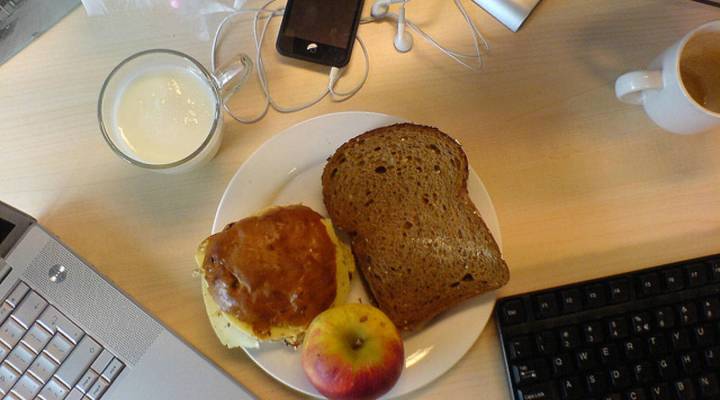
How to make lunch at your desk less sad

A limp salad thrown into Tupperware. A PB&J served on a paper towel. A stolen slice of break-room birthday cake.
This is the “Sad Desk Lunch,” a familiar, sorry sight for many an office worker. They’re often eaten quickly, while hunched over a keyboard.
Bon Appetit Editor-in-Chief Adam Rapoport wants you to know it doesn’t have to be this way. The magazine’s January issue is all about being “healthy-ish,” and on his podcast, Rapoport and Bon Appetit talk about how to make “Lunch al Desko” a joy rather than an occupational hazard.
“I think that lunch is one of those few things you actually have to look forward to during your work day,” Rapoport said. “Not that the rest of your job is terrible, but it’s like ‘this is my time.'”
It should be noted that, as a food magazine headquartered in the gleaming 1 World Trade Center, Rapoport and his staff have access to a robust test kitchen and some fancy ingredients you might not find in a typical office park. Still, there are several fundamental changes everyone can make to enjoy your lunch break a whole lot more.
Step one: Plan ahead and stock your fridge
When you’re cooking at home over the weekend, Rapoport recommends making some extra farro or wild rice. Keep the leftovers in the fridge and use them as foundation for lunches later in the week.
When the time comes, throw in some veggies, a dressing, or a hard-boiled egg.
“Bam, you’ve got, like one of those fancy grain bowls that your friend next to you in the cubicle paid $14 for,” Rapoport said.
Step two: Skip the microwave and eat at room temperature
Even if your co-workers observe Office Law — absolutely no fish — the break room microwave isn’t a great scene. Avoid it altogether by learning to love food at room temperature.
That means the extra stuff you toss in with your grains will need to be flavorful. Rapoport suggests keeping long-lasting ingredients like hot sauce, kimchi and pickled veggies in your fridge. Then, slice up some fresh veggies or add herbs.
“That’s what I love having: a combination of sort of long-cooked, stewed sorts of ingredients and fresh crispy bright ingredients.” he said. “That sort of wakes up your lunch.”
Step Three: Build a desk pantry
Start thinking of cutlery and produce as essential office supplies. Rapoport keeps a nice sharp knife and a cutting board at his desk.
“Keep it in your drawer like you might keep a comb or something,” he said.
Slicing up seasonal fruits and veggies or fresh herbs, and assembling it in the office will keep your lunch flavorful and fresh without getting soggy and weird.
Step Four: Don’t eat lunch in the same container you brought it in
A stained coffee mug shouldn’t be the only dish at your desk. Once you’ve assembled your lunch, transfer it to a real bowl and eat it with a real fork and spoon. It’ll make your already delicious lunch taste so much better.
“Eating out of, like, a Tupperware container? That’s depressing.” Rapoport said. “Don’t be one of those guys at ease with the plastic fork, that’s just sad. The plastic spoon you get at the cafeteria that it has a film on it? Ugh. No. We can’t have that.”
There’s a lot happening in the world. Through it all, Marketplace is here for you.
You rely on Marketplace to break down the world’s events and tell you how it affects you in a fact-based, approachable way. We rely on your financial support to keep making that possible.
Your donation today powers the independent journalism that you rely on. For just $5/month, you can help sustain Marketplace so we can keep reporting on the things that matter to you.












